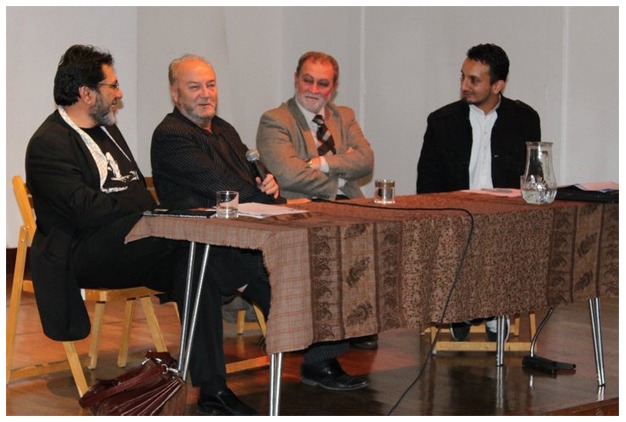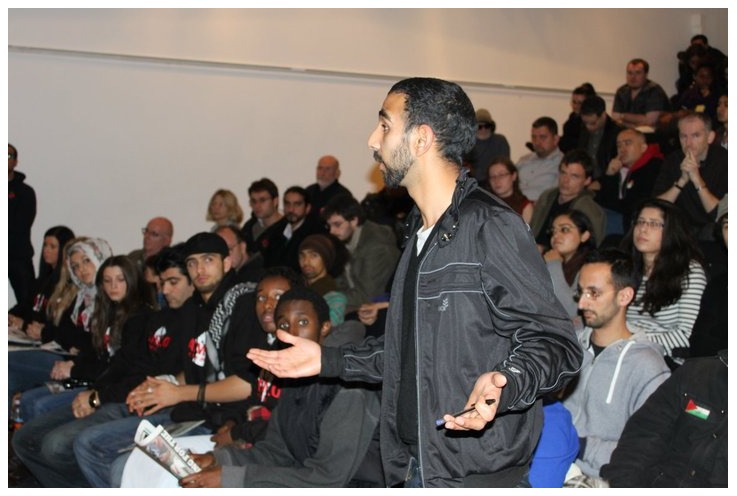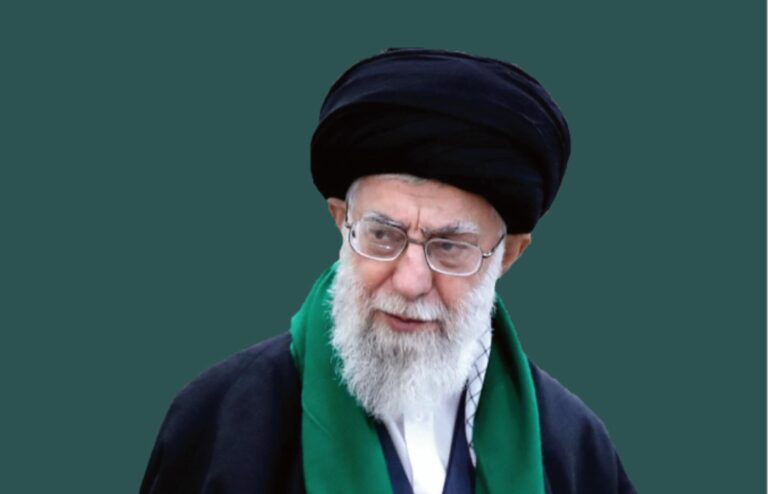Saturday 6th November saw 100 people, overwhelmingly young people attend the Sons of Malcolm organised event hosted by the Venezuelan Embassy entitled: The Outbreak of the Intifada: Turning Back the Empire. In the days leading up to this event, the Zionists through their press attempted sabotage the day and bully the organisers. Their attempts utterly failed. What the Zionists are perhaps scared of is that the people of the resistant Global South, represented by the speakers and organisers of the event are uniting and asserting their views and struggles in the heart of London, and that this is a very small part of a much larger process of unity that is gradually defeating neo-colonialist hegemony across the world. As the vanguard of western domination and racism in the world, the Zionist state understandably is perturbed by these developments across the world led by movements that are struggling to bring into existence a world where empire and white supremacy are replaced with peace, mutually beneficial cooperation and development.
Sukant Chandan introduced the evening by saying that it was not going to be a typical Palestine solidarity event – it wouldn’t be focused on self-congratulation but on challenging complacency and ineffectiveness within the movement.
Chandan set the scene for the meeting by stating that, in his opinion, the start of the second Intifada in 2000 marked the first big rallying call for the oppressed people of the world to fight back against the US empire, which had dominated for a long time but especially since the collapse of the Soviet bloc. The 1990s were a time of massively expanded economic penetration (via shock therapy and structural adjustment) and political/military control – the era of the New World Order; the ‘end of history’ according to Francis Fukuyama.
However, this reactionary era contained the seeds of its own destruction. First, while the US’s attention was focused so strongly on the Middle East, in particular Iraq and Palestine, many countries in Latin America took advantage of the breathing space to break out of empire control, putting an end to the one-sided relationship that had prevailed between North and South America for so long.
Second, the oppression in Palestine led to the outbreak of the second Intifada, which came to be seen internationally as the most important and significant outbreak of resistance; it gave oppressed people everywhere hope and guidance; it demonstrated that the empire could and would be defeated.
The first speaker was Alvaro Sanchez, a senior official from the Venezuelan Embassy, who read a statement from the Venezuelan ambassador, Samuel Moncada. The statement was issued in response to the article that had appeared in the Jewish Chronicle, labelling the meeting as supporting terrorism and advising the police to prevent it from taking place. Moncada pointed out that Venezuela did not support terrorism in any way; on the contrary, it supports peace and justice around the world. For this precise reason, Venezuela loudly condemned the 2009 bombardment of Gaza and the 2010 murder of international peace activists on the Freedom Flotilla. For this precise reason, Venezuela supports an end to Israel’s illegal occupation.
Next up was Dr Azzam Tamimi, director of the Institute of Islamic Political Thought. Tamimi pointed out that the word ‘Intifada’ had become part of the vocabulary of nations. He described its literal meaning as being something along the lines of “spontaneous reaction from within as a result of external pressure”.
Dr Tamimi pointed out that, if you look at the history of the Middle East and the Islamic countries, it is largely peaceful. Hatred only came in the colonial era; it came from outside. Now hatred has crept into our soil. Never before in the history of Iraq did anyone kill Christians – people lived together peacefully in Iraq, including the most ancient Jewish community in the world. Now, however, since the US-led invasion, Christians are not safe in Iraq. Why is there tension in Egypt? Or anywhere else in the Middle East? Because of colonialism: British, French and, worst of all, US. The so-called civilisers have taken their barbarism to Palestine – one of the most beautiful and advanced civilisations.
Dr Tamimi pointed out that Intifada, for many, means that death is more honourable than life. It is a reaction to extreme injustice. If your enemy has massive strength, are you to be blamed for using every means at your disposal in your struggle against that enemy?
Dr Tamimi explained the context of the second Intifada – that it occurred at the end of of a decade-long (largely successful) attempt by Israel to subvert the leadership of the Palestinian struggle; to transform the PLO into an agency of collaboration. That attempt was finally broken when Arafat refused to back down at the Camp David talks. After that, Arafat – who had for a long time been going along with Israeli plans – himself actively supported the Intifada.
The second Intifada was different to the first, in that it was more organised. The major organisations – Hamas and Fatah – were better established and more experienced. More weapons were available. The resistance was very effective.
Dr Tamimi assured the audience that a third Intifada will come. The occupation must be undone. We don’t oppose anybody for reasons of religion or ethnicity; we simply want our rights. Until we have these, Intifada is inevitable. We have no way of predicting when the next Intifada will break out, but there’s no doubt that it will.
Dr Tamimi finished by noting that the Israel-Palestine conflict is more widely understood today than ever before. Palestinians have wide support. He saluted Chavez and Venezuela, pointing out that Venezuela does for Palestine what most Arab regimes refuse to do. Egypt could very easily end the blockade of Gaza, but instead the collaborate and participate in that blockade. Nonetheless, the support Palestinians receive worldwide shows us that our struggle is just and will succeed.
The next speaker was Massoud Shedrajeh from the Islamic Human Rights Committee. Shedrajeh pointed out that the Intifada showed everybody around the world that the masses could rise up against a seemingly all-powerful oppressor; that they could “turn the impossible into possible.” He spoke also of the inspiration given by the Vietnamese, who had similarly inflicted defeat on the most powerful colonial country in the world.
Shedrajeh said that the lack of international support for Bosnia had made the Palestinians realise that they couldn’t rely on the international community to make peace for them; they had to rely on themselves, using whatever means they had. If all we have is stones, then we use stones. This realisation itself was a victory.
Since then, Israel has not been able to win any battle. In Lebanon they were roundly defeated. Even in Gaza, the enormous bombardment couldn’t defeat or demoralise Gazans. This was a terrible psychological defeat for Israel – they thought Gaza was an easy target, but they weren’t able to break the Palestinians’ resolve. What can the Israelis do against a people who have absolutely nothing except their beliefs and their demands?
Shedrajeh called for an expanded support for the Palestinian struggle, in spite of the demonisation and criminalisation supporters may suffer. He noted that, at the demonstration in opposition to Israel’s bombardment of Gaza, police kicked and pushed women and children; a thousand people were arrested; people got 1-2 year prison sentences for throwing plastic bottles of water. Shedrajeh said that those who stood up must be proud of themselves, and they should be considered by us as heroes. If it has taught us nothing else, Intifada has taught us that we all must stand up against our oppressors, no matter how strong they seem.
Shedrajeh concluded by congratulating the Venezuelan Embassy for not being cowed by the Jewish Chronicle’s bullying; we must follow their example.
In response to a question from the floor about what young people should be doing to support the Palestinian struggle, Shedrajeh said that there any dozens of activities going on and that young people should get involved in as many as possible. He stated that the boycott is very important and must be expanded. He said that support for prisoners is crucial, and that people should organise around that issue. Also civil disobedience and non-violent direct action were potentially very effective tools that could be used in the west in support of Palestine. He encouraged people to engage with numerous organisations and activities, and to up the pressure on Israel and on the British government.
The final speaker was George Galloway. George joined the other speakers in congratulating the Venezuelan Embassy for its resolve, and he pointed out that Venezuela was a very consistent friend of all movements for freedom and justice. He pointed to the breakdown in the meaning of words that has occurred when anyone can refer to Hugo Chavez as a ‘dictator’. Chavez is the most elected leader in the world; he has won more elections and referenda than anybody else on the planet. For Fox News and others who call him a ‘dictator’, it’s clear that the words ‘dictatorship’ and ‘democracy’ have no meaning. It’s 1984. The truth have become lies and lies have become truth.
The word ‘terrorist’ is another prime example. How can Israel, which only months ago murdered international peace activists, call anybody else terrorists? You could argue that Israel is the inventor of modern terrorism. The terror gangs of the 30s and 40s became Israel’s political leadership. Shamir, former Prime Minister of Israel, when he was a member of the Stern Gang, personally shot UN envoy Count Bernadotte in the face. And yet nobody tried to prevent him from talking at meetings in London or anywhere else.
The press loves to complain that Iranian President Ahmedinejad wants to “wipe Israel off the map”. Let us overlook the fact that this is an absurd misrepresentation of what Ahmedinejad actually said, and take it at face value. Israel is actively trying to wipe Palestinians off the map, having already wiped the Palestinian state off the map. Israel hoped that, when they wiped the *country* off the map, the Palestinian people would follow; they would become Jordanians, Syrians and so on. But they refused. They did not fade. They refused to be an ex-nation. If they had become an ex-nation, there would be no problem for us now to celebrate their legacy, to look at their artefacts in the museum an so on. But they refused to become an ex-nation; they resisted; they fought back; and therefore we are labelled as ‘supporters of terrorism’ and victimised for supporting them.
Galloway finished off his contribution by answering the charges of the Zionists that supporters of Palestine are anti-Jewish. He said: “I’ve been in the left wing movement all my life. Marx was a Jew; Trotsky was a Jew; Einstein was a Jew; Chomsky’s a Jew! It would be an irreconcilable contradiction for me to be antisemitic. Hundreds of thousands of Jews in Israel support Palestinian rights. Meanwhile the staunchest defenders of Zionism are the Christian right, who hate Jews!”
In response to a contribution regarding the division between Hamas and Fatah, Galloway stated his opinion that the divide was disastrous but by no means permanent. He said that unity talks were taking place and that they would succeed. He pointed out that Hamas and Fatah were both necessary components of the resistance struggle.
Two or three questions from the floor covered the issue of why Palestine is such a prominent issue, and why it gets more attention than, for example, Colombia, Congo or Kashmir. Shedrajeh stated clearly that Palestinians stand with all oppressed people and that all instances of oppression and injustice must be exposed and defeated. However, the economic, political, strategic, religious and cultural importance of Palestine is such that it is never far from people’s minds. George pointed out that far more people have died in the Kashmiri Intifada than in the Palestinian Intifada; however he said that “Palestine is basically the centre of the world, because of its strategic and religious importance.” He also noted the changing attitude of the world towards Israel. “The world fell out of love with Israel a long time ago.” It used to be considered a great, moral, liberal place, full of equality and kibbutzes (although he pointed out that “kibbutz socialism is a group of thieves sharing their spoils equally”). Now, however, people understand that Israel is a terror state and that the Palestinian struggle is just. Soon even the US state will wake up to the idea that it is more important to have relations with the world’s two billion Muslims than it is to be a prop to this isolated little apartheid state of Israel.
Overall it was a very successful event, made that much more successful thanks to the Zionists kicking up a their usual cowardly and hypocritical fuss which failed abysmally in its bullying attempts. This was the second in a series of events that seek to explore and commemorate the Intifada and its impact on the Palestinian Revolution, the region and the world. The third event will take place in February 2011 at SOAS, which will be called The Intifada and the Media, which will explore the impact of the Intifada on the regional and international media and it ramifications.
The Global South and their allies in the ‘West’, cannot be stopped in what is a general historical trajectory which is leading this world out of the mass death and genocide which Empire has and is continuing to subject us to. Palestine has been at the forefront of the revolutionary transformation of the world, and in so doing they have sacrificed an incredible amount. At the very minimum our duty is to always stand by the resistant and ascendant ‘Third World’, with the Palestine Revolution as its vanguard.
By: Sukant Chandan and Carlos Martinez

Related Links:
Venezuelan embassy in UK to commemorate intifada
Venezuelan Embassy criticised for Intifada celebration
Leila Khaled’s statement to intifada event at Venezuelan embassy, London
Sukant Chandan is London-based filmmaker and journalist and runs the blog Sons of Malcolm.
Carlos Martinez is a cultural activist and analyst and runs the Beat Knowledge blog.






